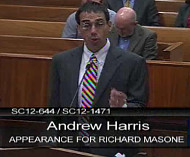Article from: www.thenewspaper.com/news/42/4256.asp
11/11/2013
Florida Supreme Court Prepares Red Light Camera Ruling
Oral arguments heard in Florida Supreme Court case over the validity of red light camera tickets issued before July 2010.
 Florida's highest court on Thursday heard oral arguments in the case that will decide whether photo enforcement vendors and municipalities jumped the gun by installing red light cameras before the state legislature granted the authority to do so. Lawyers for a group of motorists filed class action lawsuits against the cities of Aventura and Orlando seeking refunds of the tickets issued before legislative permission was granted in July 2010.
Florida's highest court on Thursday heard oral arguments in the case that will decide whether photo enforcement vendors and municipalities jumped the gun by installing red light cameras before the state legislature granted the authority to do so. Lawyers for a group of motorists filed class action lawsuits against the cities of Aventura and Orlando seeking refunds of the tickets issued before legislative permission was granted in July 2010.
The question turns on whether the early photo ticketing program was in conflict with state law. Cities argue their home rule authority allows them to regulate traffic with cameras, while the motorists' lawyers Andrew Harris and Jason D. Weisser argued that localities are expressly preempted from changing state law. Most of the justices appeared to side with motorists, with one notable exception.
"If we have to discuss this, why wouldn't we give the benefit to the municipalities in light of their home rule power?" Justice Barbara J. Pariente asked.
Harris responded that the legislature has already instructed municipalities how to deal with the conduct of red light running. The municipalities here were trying to impose harsher penalties for the identical conduct, which Florida's legal precedent does not allow.
"Under the ordinance in Orlando, they can take away your occupational license, your building permits," Weisser said. "That's not contemplated by the statute, and it never was... So the penalties are so much more severe under their ordinance."
In Aventura the fine rose to as high as $500, and in Orlando $250 under the pre-2010 red light camera ordinance.
"This seems to me to be pretty clear," Justice Charles T. Canady said. "What we have here are additional penalties that are imposed, and it says here in the section which is headed 'Preemption of additional fees, fines, surcharges and costs.' If that's not express preemption, I don't know what would be."
The attorneys for the motorists pointed out that penalties differ from city to city and traffic light to traffic light, which is the opposite of what the legislature intended with a uniform traffic code. The state wanted to eliminate the variation in traffic laws from jurisdiction to jurisdiction.
"The entire concept behind the uniform traffic code is the uniformity throughout the state so that if a driver is traveling from Tallahassee to Monroe County the laws will be the same," Weisser explained. "Even assuming that the municipalities had the authority to enact their ordinance, it can't conflict with the state law. One of the ways that it did was, number one, it turned this into a vicarious offense. Anywhere else in the rest of the state if somebody blows through a red light, the driver is responsible."
With photo tickets, the owner of a vehicle is held responsible because it takes much more effort for the traffic camera vendor to positively identify the driver. A decision against the cities could cost millions in refunds, as happened when the Minnesota Supreme Court forced Minneapolis to refund $2.6 million in red light camera tickets issued without the authority of the legislature.
 Florida's highest court on Thursday heard oral arguments in the case that will decide whether photo enforcement vendors and municipalities jumped the gun by installing red light cameras before the state legislature granted the authority to do so. Lawyers for a group of motorists filed class action lawsuits against the cities of Aventura and Orlando seeking refunds of the tickets issued before legislative permission was granted in July 2010.
Florida's highest court on Thursday heard oral arguments in the case that will decide whether photo enforcement vendors and municipalities jumped the gun by installing red light cameras before the state legislature granted the authority to do so. Lawyers for a group of motorists filed class action lawsuits against the cities of Aventura and Orlando seeking refunds of the tickets issued before legislative permission was granted in July 2010.